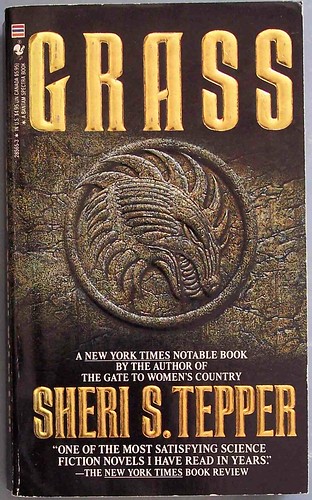(photo by Chris Drumm)
Note: This is a re-read for me. Grass was originally published in 1989, so I first read it maybe twenty years ago. I remembered the setting and the general idea of the story, but not the details. So it was a lot of fun to read again.
Plague, incurable and unstoppable, is loose on every human planet but - perhaps - this one, and Sanctity, the religious organization which rules humanity, needs to find out why. "Grass" is, reasonably enough, the name of a planet of vast grasslands, settled by minor European aristocrats whose main interest - only interest, really - is fox hunting. They've also become terribly insular, with no interest in anything or anyone elsewhere. Plague on other planets would not interest them, and it must be kept a secret, just a scary rumor for most people, anyway.
So Sanctity sends Roderigo Yrarier, along with his family, to Grass as ambassador, secretly assigned to determine if plague really is nonexistent on the planet. They're all skilled riders, and should fit in well with the local aristocrats, it's thought. But as it turns out, Sanctity knows very little about Grass. The aristocrats hunt, but the fox isn't really a fox, the mounts aren't horses, and the hounds aren't dogs. Indeed, there's far more going on here than it first appears.
This is a long book, 450 pages long, and it starts rather slowly. That's deliberate, I suspect. It's apparent from the beginning that things aren't quite what we might expect, especially in regard to the "fox hunting." But the truth is far stranger than even our initial suspicions, and far more serious - a matter of the survival of the entire human species, in fact. As the layers peel away, we start to understand what's really going on, and then the book becomes hard to put down. So I must say that the slow beginning suits the story very well.
Sheri Tepper is known for her feminist science fiction. I really like many of her books - The Gate to Women's Country, for example, is one of my favorites. But in some cases, she beats us over the head with her feminist perspective. Don't get me wrong, I generally agree with her philosophy, but I don't want it to get in the way of a good story.
Grass is one of her best novels. It's has a definite feminist slant, but not at all to excess. Her heroine, Marjorie Westriding Yrarier, is an appealing character struggling in an unhappy marriage. But her husband isn't really a bad guy. He has some admirable qualities, in fact. But he doesn't understand her, and she doesn't understand him. In general, it's just a bad match, made worse by their culture on Earth. Marjorie is truly the hero in this book, but her husband isn't a cartoon caricature of a villain - or any kind of villain, really. I like that.
Tepper certainly makes her point about patriarchal societies, and patriarchal religions, but she doesn't beat us over the head with it. For the most part, this is a fascinating story of an alien world. It's a mystery, too, in a way. There are secrets which must be uncovered before it's too late. There are villains, alien and human, but not all of the villains are fully responsible for their misdeeds.
Living here in Nebraska, I've become a fan of prairies. I've even learned to identify many species of native grasses, what I would have dismissed as just "grass," or even just "weeds," when I was young. So the description of this planet of varied grasses particularly appealed to me. Some of the grasses are like giant bamboo, towering far above human height and useful as building material. Others are more similar to our own tall-grass and short-grass prairies. And they come in all sorts of colors. It's a fascinating world (not especially plausible, perhaps, but still very neat).
Another detail that I loved was the relationship between the aristocrats and the commoners on Grass. In this respect, too, things are different from how they initially appear - or, perhaps more precisely, different from our unconscious assumptions about the relationship. As I mentioned, the aristocrats are very insular, and that applies even on their own world. So their own assumptions aren't necessarily accurate, either.
Grass is a long novel (though pretty typical in length these days), and it takes awhile before the story really grabs a reader. But it will grab you, and it's worth the effort, it really is. It's a fine book.

I'm still not too far into the novel so I'm still waiting for it to start to get good and I haven't figured out what is going on with the hunt yet.
ReplyDeleteJohn
Tepper is a writer who occasionally drives me up the wall. I've read many of her books, with reactions ranging from "okay this is pretty good," to "oh gods no, make the stupid stop."
ReplyDeleteI've enjoyed most of what I've read by Sheri Tepper, starting with her "True Game" fantasy series in the 1980s. And I've heard great things about her "Marianne Trilogy," though I've never been able to find it anywhere.
ReplyDeleteBut yes, there have been a couple of books, in recent years, which I didn't like much at all. I think she was trying too hard to make a point, rather than just writing a good story. (She's 81 now, which I hope doesn't make any difference, but... I suppose it might.)
But I can usually shrug off stuff like that if it doesn't happen too often. I can't say that she's one of my very favorite authors, but I've ended up reading quite a few of her books over the years.